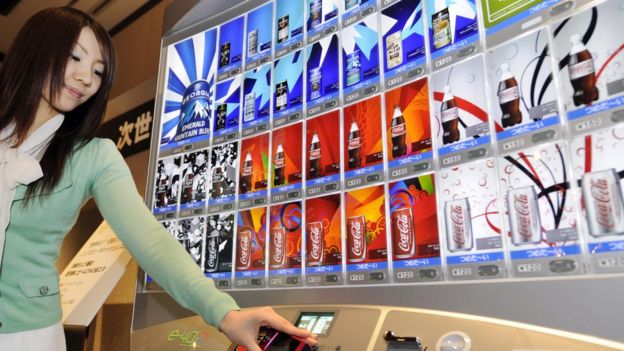Principle-Degenerate to Generate Profit
 |
| Coca-Cola says it markets dozens of new products on the Japanese market every year Getty Images |
"[The move is a] modest experiment for a specific slice of our [Japanese] market."
"We haven't experimented in the low alcohol category before, but it's an example of how we continue to explore opportunities outside our core areas."
Jorge Garduno, Coca-Cola's Japan president
"Young people don't feel like they are drinking alcohol because there is so much sugar and there is a lot of alcohol as well."
"Health Canada needs to take a look at that."
Lucie Charlebois, Quebec public health minister
"It was a mistake to enter this category to compete with Four Loko."
"In fact, the Four Loko category should not even exist."
"Last Friday I also ordered the removal of all advertisements that concern it — it’s the right thing to do."
Aldo Geloso, co-owner, Geloso Group
| It's clear that the FCKD UP cans were designed to appeal to a younger demographic, Christopher Curtis, Montreal Gazette |
Phusion Projects manufacturers Four Loko, and it is safe to assume they produce a beverage that attracts young consumers who may not realize how loaded the drink is with alcohol. On the other hand, the tins clearly state the alcohol content. But it obviously provides the drink manufacturer with ample incentive to continue producing it because the profits are appreciable. And it was that profit quotient that attracted the attention of the Geloso Group which, in 2017 introduced their own product, FCKD UP.
It is perfectly clear moreover, that Geloso Group targeted young people as consumers of its product; its advertising and the coloured cans that hold the drinks are not meant to attract any but the young. Most unfortunately, a dreadful occurrence was reported last week, where a 14-year-old girl, Athena Gervais, was found dead near a stream close to her Laval high school. She and friends had lifted cans from a convenience store nearby their high school and she is said to have consumed several of those cans before dying.
 Athena Gervais.
Athena Gervais, 14, disappeared Feb. 26. Her body was found behind her school three days later.
Athena Gervais.
Athena Gervais, 14, disappeared Feb. 26. Her body was found behind her school three days later. Now, the co-president of the company whose drink it was, has announced it is immediately discontinuing manufacture of the drink, and the Quebec-based convenience store chain Couche-Tard will no longer sell the offending beverage. This is not an illegal drink. Young people can purchase it and drink it, as they would any other drink. But what they are buying and consuming is a high-alcohol beverage at their local convenience store at lunchtime, in the process becoming intoxicated and ill. They're looking for the buzz, some deliberately wanting to become drunk.
"Health Canada is already working with the government of Quebec to address this issue", responded spokesman Eric Morrissette who also mentioned that alcoholic or energizing beverages are sold legally in Canada; Health Canada is not responsible for giving approval to their sale. On the Four Loko website there is a hypocritically sanctimonious statement that reads: "Unfortunately, any alcohol beverage can be abused if not consumed responsibly. The issues of irresponsible alcohol consumption will only be solved by increased education, stronger enforcement of existing laws and personal responsibility."
In the industry that kind of beverage is referred to as "alcopop", with the full knowledge of what it contains and how it can affect the age demographic that advertising the product is meant to attract. It isn't particularly new on the market, it's been around since the 1990s in the United Kingdom where brands like Hooch, Reef, Smirnoff Ice and Bacardi Breezer became immensely popular, the names attracting teens who want to be adults and do the things that adults are known to do. The names of these drinks tell them they can.
They're easy to access and easy to drink. There's no off-putting odour emanating from them as there is with beer, it's the sweet taste that covers up the alcohol and caffeine-containing product, and taste is given a fruity flavour, like lemon, orange, mimicking the familiar but with the added fillip of producing a high. Their marketability is undeniable, as is the huge profit associated with their sales, making them controversial in that they encourage young people to indulge in drinking large quantities of alcohol.
Wherever there is profit to be made and the allure of diversifying popular products, there will be a huge corporation like Coca-Cola whose executives endlessly sniff out enhancing their bottom line. That huge international beverage manufacturer is looking at their Japanese market, planning to introduce just such an alcoholic pop to young Japanese who have been introduced to the concept with their own national brands. Where a local spirit called shochu is added to Chu-Hi, a canned sparkling flavoured drink, between 3 and 8 percent alcohol by volume.
Famously, Japan has street vending machines everywhere, selling food and hot and cold drinks in a culture that likes convenience and availability. And despite the questionable ethics involved in selling quasi but powerful alcoholic beverages to children, where there is profit to be made through the commercialization of children yearning to be adult and emulating what the mature population does, it's just a matter of popularizing a unique brand to grow the market and enhance the bottom line.
Labels: Addiction, Advertising, Alcohol, Child Welfare, Corporate Greed

0 Comments:
Post a Comment
<< Home